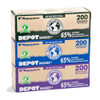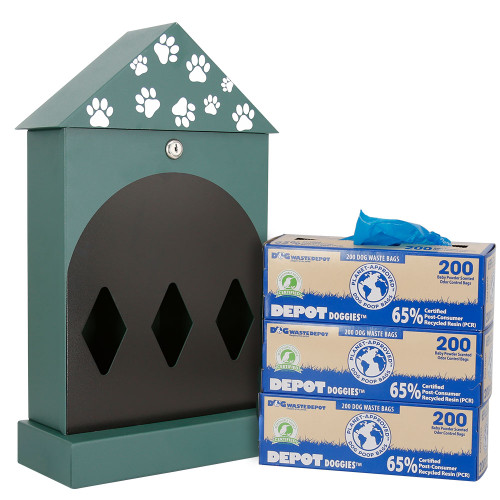Product Description
DEPOT DOGGIES™ 65% PCR are made with recycled, certified Post-Consumer Resin (PCR) Fido Baggies® are 100% new plastic--they are not earth-friendly. AND...DEPOT DOGGIES™ 65% PCR are 50% thicker & 33% cheaper than Fido Baggies®. Plus they fit Fido dispensers.
Choose LAVENDER SCENTED PURPLE, BABY POWDER SCENTED BLUE or UNSCENTED GREEN. STOP overpaying for Fido Baggies®. DEPOT DOGGIES™ 65% PCR are a better choice, better value, and certified better for the environment.
|
Color Choice: Purple, Blue, or Green |
Scent: Lavender, Baby Powder, or Unscented |
|
Bag Size: 8" x 13" |
Thickness:18 microns (vs. their 12 microns) |
|
Box Size: 8.5" x 3" x 3" |
Roll Qty: 200 bags per roll |
|
Roll Info: Textured Surface-easy open |
Case Qty: 10 Rolls Per Case = 2000 Bags |
50% Thicker - 33% cheaper - Same Bag, Roll & Box Size.
PRICE: DEPOT DOGGIES™ $99.79 vs. Fido Baggies® $149.79
THICKNESS: DEPOT DOGGIES™ 18 microns vs. Fido Baggies® 12 microns
TEXTURED SURFACE: DEPOT DOGGIES™ Yes, for easier opening vs. Fido Baggies® No.
MATERIAL: DEPOT DOGGIES™ are 65% certified recycled PCR vs. Fido Baggies® 100% new plastic.
ODOR CONTROL: Choose scented for odor control vs. Fido Baggies® have no odor control scent.
Stronger, thicker, cheaper than Fido bags. End resident complaints about thin Fido bags ripping.
Order Today. Ships Today. Always Free Shipping. For use in DEPOT-152 Bag Dispenser. Fits Fido dispenser.
BUY a pallet of 102 cases for only $67.79 per case = $6914.58 for 102 cases. Free Shipping.
What is Post-Consumer Resin (PCR)?
Post-consumer resin (PCR) refers to recycled plastic resin that is derived from plastic products that have been used and disposed of by consumers. PCR is collected through recycling programs, sorted, cleaned, and processed into new plastic products. PCR helps to reduce the amount of plastic waste ending up in landfills or oceans, conserves natural resources, and lowers energy consumption compared to producing new plastic from raw materials.
- Reduction of Plastic Waste: PCR helps divert plastic waste from landfills and oceans, mitigating the environmental impact of plastic pollution. By recycling and reusing plastics, PCR contributes to a more sustainable waste management system.
- Conservation of Resources: Producing plastic from virgin materials requires significant amounts of fossil fuels, water, and other resources. By using PCR, the demand for new raw materials is reduced, conserving natural resources and lowering energy consumption.
- Energy Savings: Manufacturing plastic from recycled materials generally requires less energy compared to producing plastic from scratch. This results in reduced greenhouse gas emissions and contributes to overall energy conservation efforts.
- Circular Economy: PCR plays a crucial role in the development of a circular economy, where materials are reused, recycled, and reintegrated into the production process. It helps close the loop on plastic usage, promoting a more sustainable and resource-efficient approach to manufacturing.
- Market Demand and Innovation: The demand for sustainable products is increasing among consumers and businesses alike. Incorporating PCR into products allows companies to meet this demand, demonstrating their commitment to environmental stewardship. This also drives innovation in recycling technologies and encourages the development of more eco-friendly materials and processes.
Overall, PCR is important for addressing environmental concerns related to plastic pollution, resource depletion, and energy consumption while fostering a more sustainable approach to manufacturing and consumption.








































